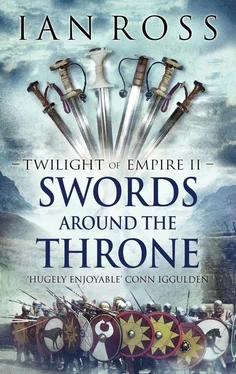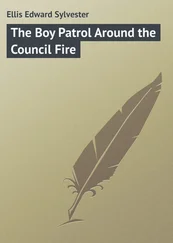Before the sudden departure from Arelate, one of the imperial eunuchs had come to him with a message, which he was pleased to read out. The emperor Flavius Constantinus Augustus – et cetera et cetera , the eunuch had said, smiling – is happy to receive the request of the distinguished Aurelius Castus, Ducenarius of Protectores, that he become engaged to the imperial ward Valeria Domitia Sabina, Clarissima.
Castus was baffled at first, then apprehensive. He had not spoken to Sabina herself since that night in the prison cell in Massilia. He had barely seen her. He sensed the knotting of a net of obligation, a snare to drag him deeper into the wiles of the imperial court. But then the joy of it rose through his fears. That night, he had given grateful sacrifice to all the gods.
There was no great ceremony to their betrothal, no banquet or exchange of lavish gifts. In the audience hall of the residency in Arelate they had stood together before Baebius Priscus, the emperor’s Quaestor and legal advisor, while a notary drew up a codicil of engagement. Sabina had appeared subdued, her face lowered beneath her veil. She was still in the drab costume of widowhood; the marriage would not be contracted until the official ten-month mourning period for her former husband had elapsed. Once their promises were exchanged and the formalities completed, Castus slipped the iron ring of betrothal onto her finger. He felt crude and coarse, and was aware of his heavy gnarled hands on her soft skin. But then he felt the gentle pressure of her touch, and through the thin gauze of the veil he saw the smile in her eyes. The memory of that smile had warmed him ever since.
Perhaps it had been genuine. Perhaps they would know happiness together. But always the shadow crept at the back of his mind, and he thought he heard a dry rasping voice whispering sly words. I am a simple man, he told himself. I am a soldier. Nobody can ask any more of me than that.
As they travelled north they met the change of season, and the weather turned chill and grey. A few days from Treveris the imperial retinue turned off the main road and branched away to the west. The emperor wished to visit the famous sanctuary of the great god Apollo, to give thanks for the retreat of the Franks and his own recent survival of the plot against his life. It was a cold day, the skies silvery with cloud as the imperial cavalcade passed between low wooded hills. Castus looked around for Brinno; his friend had ridden back down the column an hour before and had not yet returned. There would be a celebration that evening at Apollo’s sanctuary. Perhaps – he allowed himself a smile at the thought – Sabina might even consent to set aside her mourning, just for one night, and come to his bed…
There was a cry from further along the road. Horses backed and shied as the column pulled to a sudden halt. Hand on his sword hilt, Castus stared at the woods to either side, then forward along the line of march.
‘Apollo!’ a man shouted. It was Probinus, the prefect. ‘The god is with us!’
Castus peered around him, bemused. All along the column men were staring into the sky. Several dismounted and knelt beside the road. Then Castus saw the emperor climbing down from his horse and kneeling beside them.
‘The Unconquered Sun!’ one of the officials of the retinue cried, and threw up his arms in salute. Unconquered Sun, Lord of Heaven, Light against Darkness…
Looking into the sky, Castus saw only a bright point of light between the clouds. When he squinted, it seemed to expand and spread. ‘What did you see?’ he asked the rider beside him.
‘A sign from heaven!’ the man replied, wide-eyed. ‘A blessing upon our emperor…’
Twisting in the saddle, Castus stared back down the line of the column. Then a great shout rose from the people behind him, and light flooded suddenly from the sky. The carriages and carts, the horses and riders, the ranks of soldiers were illuminated in a glowing burst of sun.
All of them were shining like gods.












